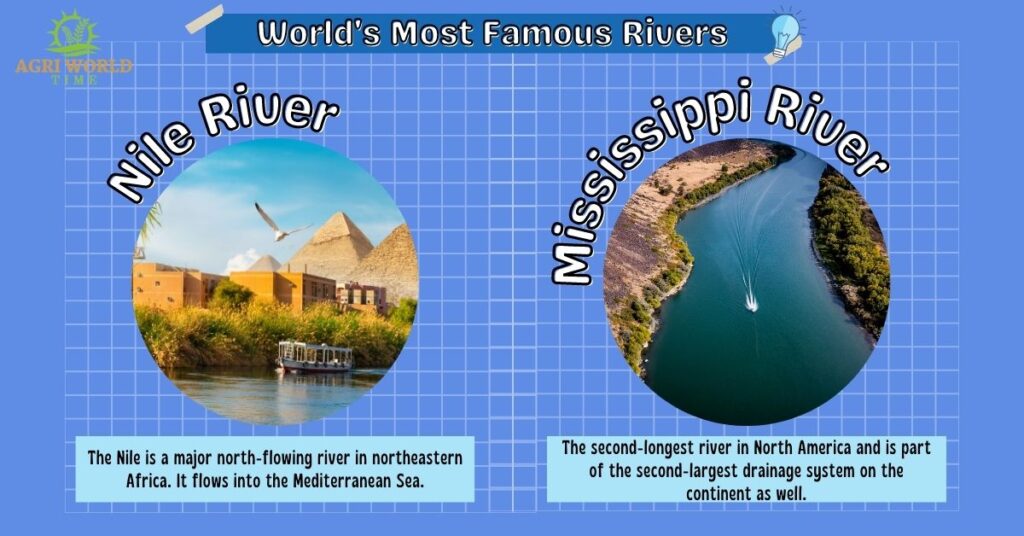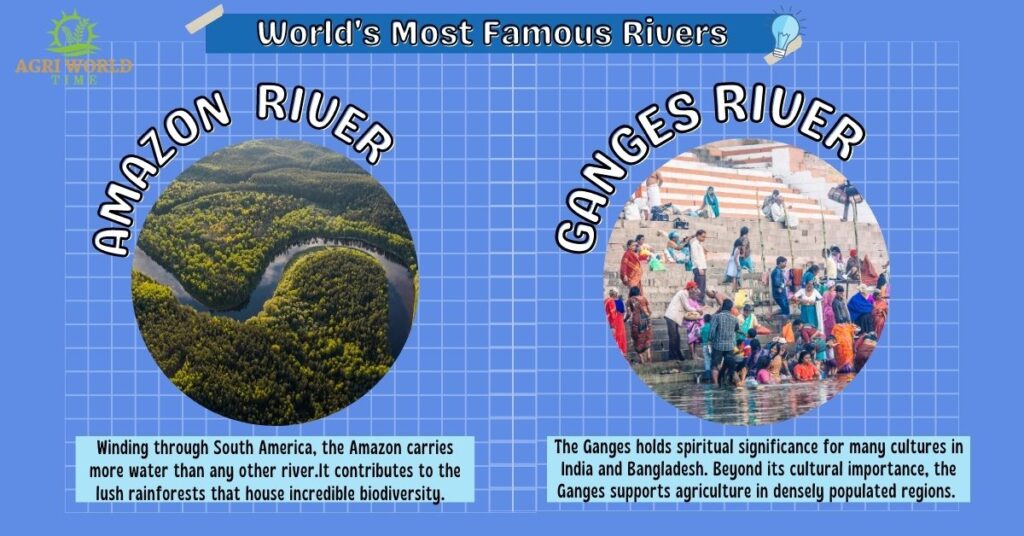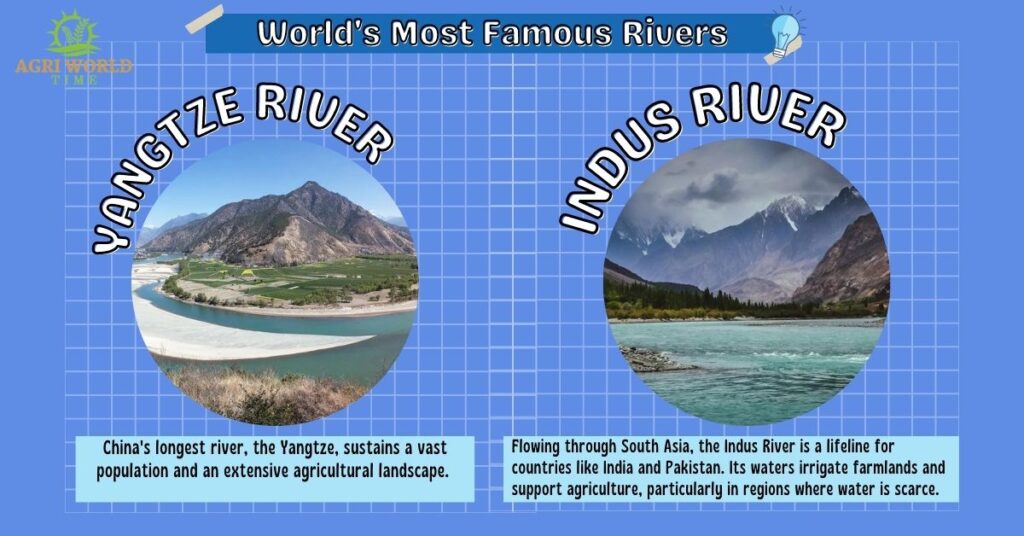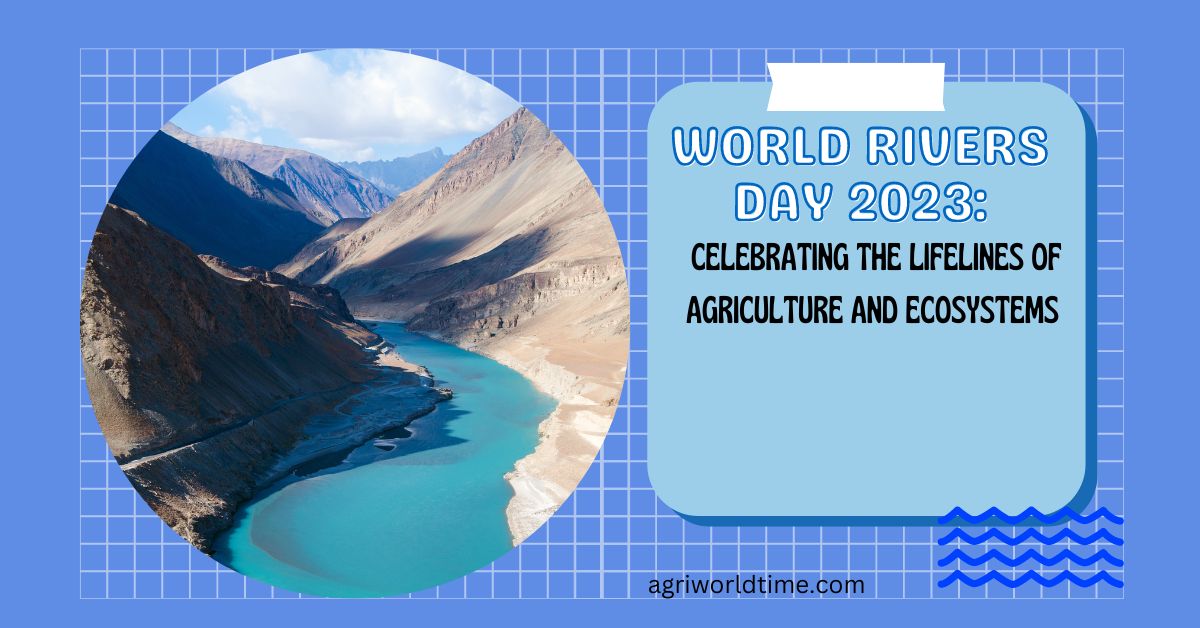Welcome to our blog, where we’re diving into a topic that affects us all – World Rivers Day. Imagine a world without rivers – no flowing water, lush fields, and life-sustaining ecosystems. Rivers might seem like quiet streams. But they’re powerful forces that play a huge role in our lives, especially when it comes to agriculture.
Today, we’ll explore the significance of World Rivers Day. It’s a day dedicated to honor these winding waterways. We’ll also recognize their vital link with agriculture, the foundation of our food and sustenance. So, let’s embark on a journey to discover why rivers matter so much to our farms, environment, environment, and future.
The History of World Rivers Day:
The story of World Rivers Day began with a deep concern for the health and well-being of the world’s rivers. In the early 2000s, two individuals with a passion for environmental conservation saw the urgent need to highlight the importance of rivers and inspire collective action to protect them.
Mark Angelo, a river advocate from Canada, and Rebecca Wodder, an American conservationist, joined forces to establish World Rivers Day. Their vision was simple yet profound: to create a global event to draw attention to rivers’ invaluable role in our lives, ecosystems, and cultures.
2005, their efforts bore fruit as the first-ever World Rivers Day was celebrated on the last Sunday of September. This day was chosen to coincide with the timing of many other environmental events. It allowed for greater synergy in addressing various issues.
The idea quickly gained traction. Over the years, World Rivers Day evolved into a remarkable platform for education, engagement, and positive change. People from all corners of the world – environmentalists, communities, schools, governments, and organizations – united on this day to raise awareness about the threats faced by rivers and to take proactive steps toward their conservation.
As each year passes, World Rivers Day continues to grow in significance. It’s not just a day to admire the beauty of rivers but also a call to action. This day, cleanup initiatives, educational campaigns, tree planting, and other activities empower individuals to make a tangible difference for the rivers that sustain us.
World Rivers Day stands as a testament to the power of collective efforts. It reminds us that no matter where we live, we all depend on rivers, and it’s our shared responsibility to protect and preserve these life-giving waterways for generations to come.
The Significance of World Rivers Day:
World Rivers Day isn’t just another day on the calendar; it’s a momentous occasion with profound significance for our planet and its inhabitants. This day serves as a powerful reminder of the vital role that rivers play in our lives, particularly regarding agriculture and the well-being of our ecosystems.
Highlighting the Importance of Rivers in Agriculture:
Rivers are lifelines for agriculture, acting as the veins that carry the lifeblood of water to farms and fields. The water from rivers nourishes crops, quenches the thirst of livestock, and supports the growth of our food. Without this essential resource, the fertile lands that sustain our agricultural systems would wither away.
Rivers as Natural Nutrient Distributors:
Rivers do more than provide water. They also transport vital nutrients that enrich the soil and enhance agricultural productivity. As rivers flow through diverse landscapes, they gather and carry nutrients from upstream areas. It ensures that downstream fields receive the sustenance they need to yield healthy and abundant harvests.
Biodiversity and Ecosystem Health:
Rivers are bustling ecosystems teeming with life. River ecosystems are interconnected networks supporting biodiversity, from the tiniest microorganisms to larger fish species. This diversity doesn’t just impact aquatic life; it also plays a crucial role in supporting pollinators and other creatures that indirectly contribute to agricultural success.
In the next section, we’ll delve into our rivers’ challenges. It threatens the health of these waterways and the sustainability of agriculture that depends on them.
Challenges Faced by Rivers and Agriculture:
While rivers are essential for agriculture and our environment, they face various challenges that threaten their health and the well-being of the communities that rely on them. Addressing these challenges is crucial to ensuring a sustainable future for rivers and agriculture.
Pollution Threats:
Rivers often bear the brunt of pollution from various sources. It includes agricultural runoff, industrial discharges, and improper waste disposal. Chemicals and pollutants find their way into rivers. It affects the water quality and the organisms that inhabit these ecosystems. This pollution has cascading effects. It impacts agricultural lands through contaminated water supplies and degraded soil quality.
Water Scarcity and Over-Extraction:
In many regions, the water demand exceeds the available supply. Climate change and unsustainable water management practices lead to water scarcity, where rivers are overused and depleted. Agriculture relies heavily on water resources. When rivers run dry or water levels drop significantly, crop yields suffer, and farmers face economic challenges.
Rising Concerns about Climate Change:
Climate change poses a significant threat to both rivers and agriculture. Altered precipitation patterns, shifting temperatures, and more frequent extreme weather events can disrupt river flows and impact agricultural production. Changes in river flow patterns can lead to floods or droughts, which can devastate crops and disrupt food systems.
The following section will explore how World Rivers Day emerged as a call to action in response to these challenges. It aims to raise awareness and mobilize efforts to safeguard our rivers and ensure a thriving future for agriculture. Now we’ll discover the major rivers of the world.
Major Rivers: Lifelines of Our World
Rivers are the lifeblood of our planet, shaping landscapes, providing sustenance, and connecting communities. As we celebrate World Rivers Day, let’s take a moment to appreciate some of the major rivers that play crucial roles in our lives:
The Nile River:
Flowing through northeastern Africa, the Nile is often regarded as the longest river in the world. Its waters have nourished civilizations for millennia, enabling agriculture to thrive along its banks. From the ancient Egyptians to modern-day farmers, the Nile has been a vital source of life.

The Mississippi River:
Navigating through the heartland of the United States, the Mississippi and its tributaries have shaped American agriculture. Its fertile floodplains and transportation routes have historically been integral to the country’s farming and trade.
The Amazon River:
Winding through South America, the Amazon carries more water than any other river. It contributes to the lush rainforests that house incredible biodiversity. The Amazon’s influence on regional weather patterns affects agriculture across the continent.

The Ganges River:
Revered by millions, the Ganges holds spiritual significance for many cultures in India and Bangladesh. Beyond its cultural importance, the Ganges supports agriculture in densely populated regions. It provides water for irrigation and livelihoods for countless farmers.
The Yangtze River:
China’s longest river, the Yangtze, sustains a vast population and an extensive agricultural landscape. It’s a lifeline for rice cultivation and other crops, essential to China’s food security.

The Indus River:
Flowing through South Asia, the Indus River is a lifeline for countries like India and Pakistan. Its waters irrigate farmlands and support agriculture, particularly in regions where water is scarce. The Indus has been a cornerstone of civilization and sustenance for centuries.
World Rivers Day: A Call to Protect and Preserve:
We’ve explored the crucial role that major rivers play in agriculture and the environment. It becomes evident that safeguarding these vital waterways is essential for our present and future well-being. World Rivers Day is a compelling call to action, urging us to come together and address the challenges that threaten our rivers and the ecosystems they support.
Conclusion:
As we wrap up our exploration of World Rivers Day, it’s evident that rivers are not mere watercourses but lifelines that sustain agriculture, biodiversity, and our way of life. This global observance is a powerful reminder of the urgent need to protect and restore these vital ecosystems. From the Nile to the Indus, the Amazon to the Mississippi, the unity displayed on World Rivers Day is a testament to our shared responsibility to ensure the health and vitality of our rivers for present and future generations. Through education, community engagement, and collective action, we have the opportunity to safeguard these precious resources and pave the way for a more sustainable and harmonious coexistence between agriculture, nature, and humanity.
FAQs
What is World Rivers Day?
World Rivers Day is an annual global event dedicated to raising awareness about the importance of rivers and advocating for their conservation. It’s a day to celebrate the value of rivers to ecosystems, communities, and agriculture.
On which day is World River Day being celebrated around the world in 2023?
World Rivers Day is observed on the last Sunday of September each year. This choice of date allows for greater alignment with other environmental events and initiatives. 2023 World Rivers Day will be held on the 24th of September.
What is the purpose of World Rivers Day?
The primary purpose of World Rivers Day is to raise awareness about the critical role that rivers play in our lives, agriculture, and ecosystems. It aims to promote sustainable river management, engage communities, and inspire efforts to conserve and restore rivers.
How is World Rivers Day celebrated?
World Rivers Day is celebrated through various activities, including river cleanups, educational workshops, tree planting, and advocacy campaigns. These initiatives aim to highlight the importance of rivers, address pollution and degradation, and promote responsible water usage.
Why are rivers important for agriculture?
Rivers provide water for irrigation, transportation, and livestock, essential for agricultural productivity. They also transport nutrients that enrich soil fertility and support biodiversity critical for pollination and pest control.
How can individuals get involved on World Rivers Day?
Individuals can participate by joining local cleanup events, attending educational workshops, and supporting organizations dedicated to river conservation. Sharing information about World Rivers Day on social media also helps raise awareness.
What is the connection between rivers and biodiversity?
Rivers support diverse ecosystems that host various plant and animal species. These ecosystems contribute to biodiversity, essential for healthy agricultural landscapes and maintaining a balanced environment.
What can be done beyond World Rivers Day to protect rivers and agriculture?
Beyond World Rivers Day, individuals can adopt water-efficient practices, reduce pollution, support policies for sustainable water management, and advocate for river conservation. Long-term efforts are essential to ensure rivers’ and agriculture’s health and resilience.

